Navigating Ethical Dilemmas in Accounting
VerifiedAdded on 2020/05/28
|10
|2409
|77
AI Summary
This assignment delves into the complex world of ethical challenges encountered by accounting professionals. It examines various scenarios where accountants may face difficult decisions and requires analysis of how to handle these situations ethically while adhering to professional codes of conduct. The focus is on developing strategies for navigating ethical dilemmas, considering legal implications, professional responsibility, and maintaining public trust.
Contribute Materials
Your contribution can guide someone’s learning journey. Share your
documents today.
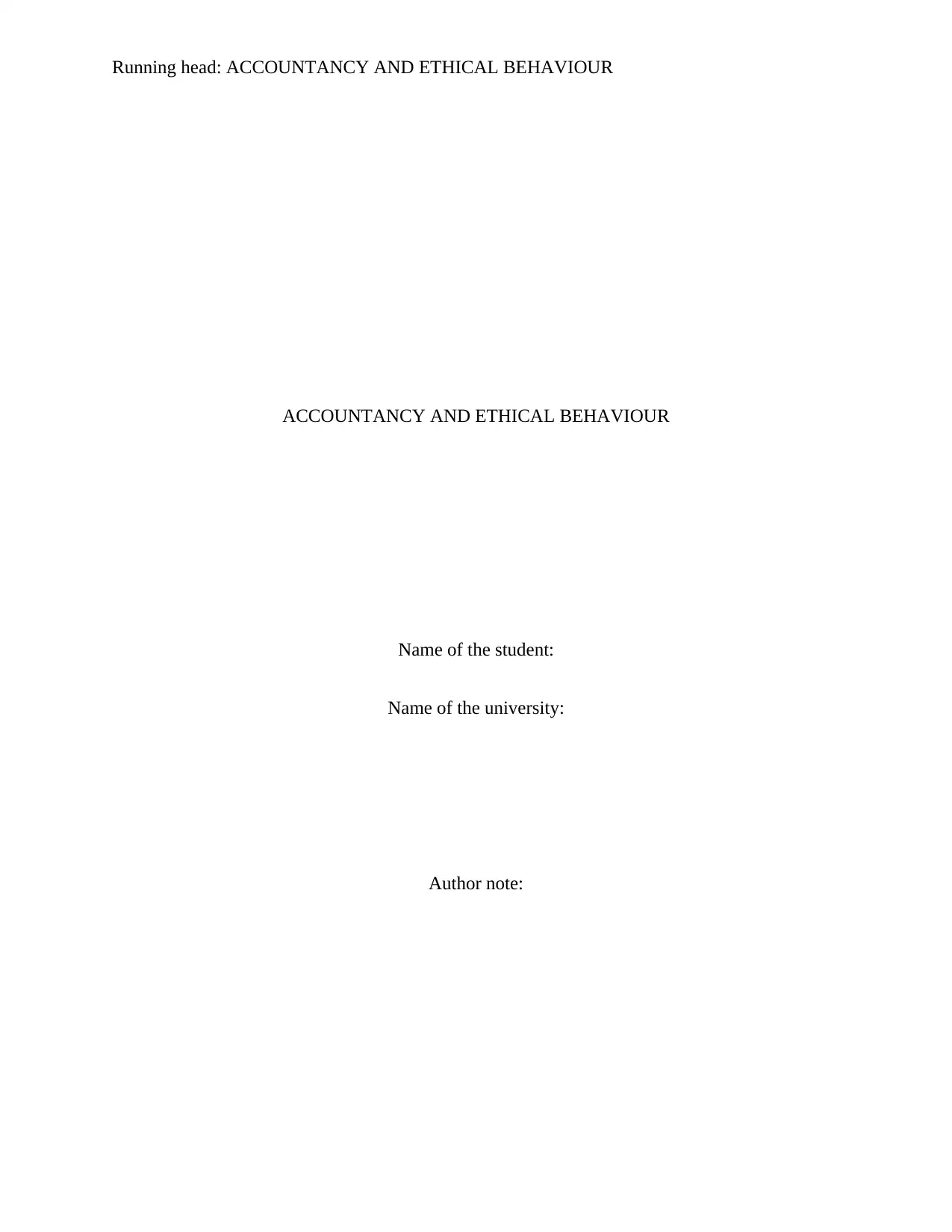
Running head: ACCOUNTANCY AND ETHICAL BEHAVIOUR
ACCOUNTANCY AND ETHICAL BEHAVIOUR
Name of the student:
Name of the university:
Author note:
ACCOUNTANCY AND ETHICAL BEHAVIOUR
Name of the student:
Name of the university:
Author note:
Secure Best Marks with AI Grader
Need help grading? Try our AI Grader for instant feedback on your assignments.
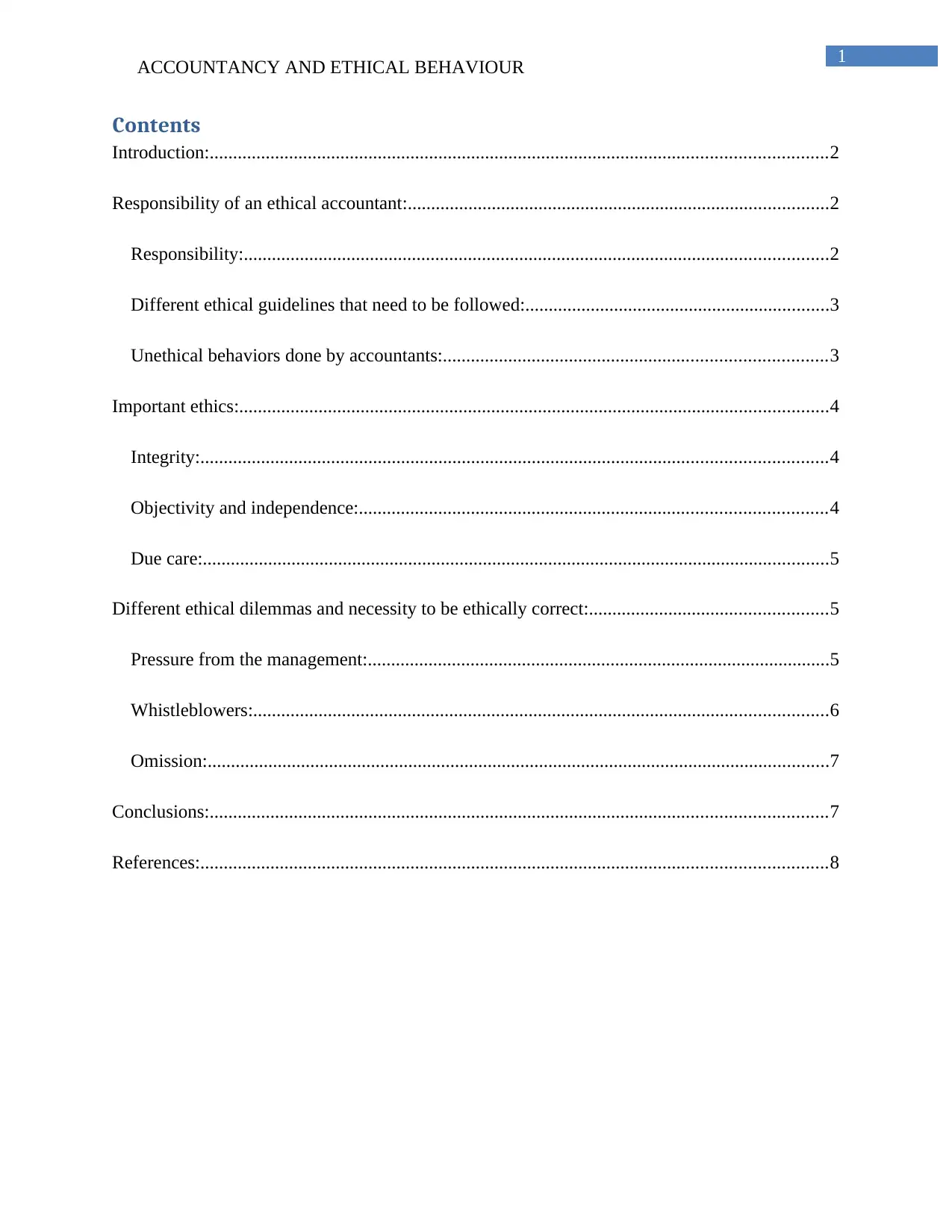
1
ACCOUNTANCY AND ETHICAL BEHAVIOUR
Contents
Introduction:....................................................................................................................................2
Responsibility of an ethical accountant:..........................................................................................2
Responsibility:.............................................................................................................................2
Different ethical guidelines that need to be followed:.................................................................3
Unethical behaviors done by accountants:..................................................................................3
Important ethics:..............................................................................................................................4
Integrity:......................................................................................................................................4
Objectivity and independence:....................................................................................................4
Due care:......................................................................................................................................5
Different ethical dilemmas and necessity to be ethically correct:...................................................5
Pressure from the management:...................................................................................................5
Whistleblowers:...........................................................................................................................6
Omission:.....................................................................................................................................7
Conclusions:....................................................................................................................................7
References:......................................................................................................................................8
ACCOUNTANCY AND ETHICAL BEHAVIOUR
Contents
Introduction:....................................................................................................................................2
Responsibility of an ethical accountant:..........................................................................................2
Responsibility:.............................................................................................................................2
Different ethical guidelines that need to be followed:.................................................................3
Unethical behaviors done by accountants:..................................................................................3
Important ethics:..............................................................................................................................4
Integrity:......................................................................................................................................4
Objectivity and independence:....................................................................................................4
Due care:......................................................................................................................................5
Different ethical dilemmas and necessity to be ethically correct:...................................................5
Pressure from the management:...................................................................................................5
Whistleblowers:...........................................................................................................................6
Omission:.....................................................................................................................................7
Conclusions:....................................................................................................................................7
References:......................................................................................................................................8
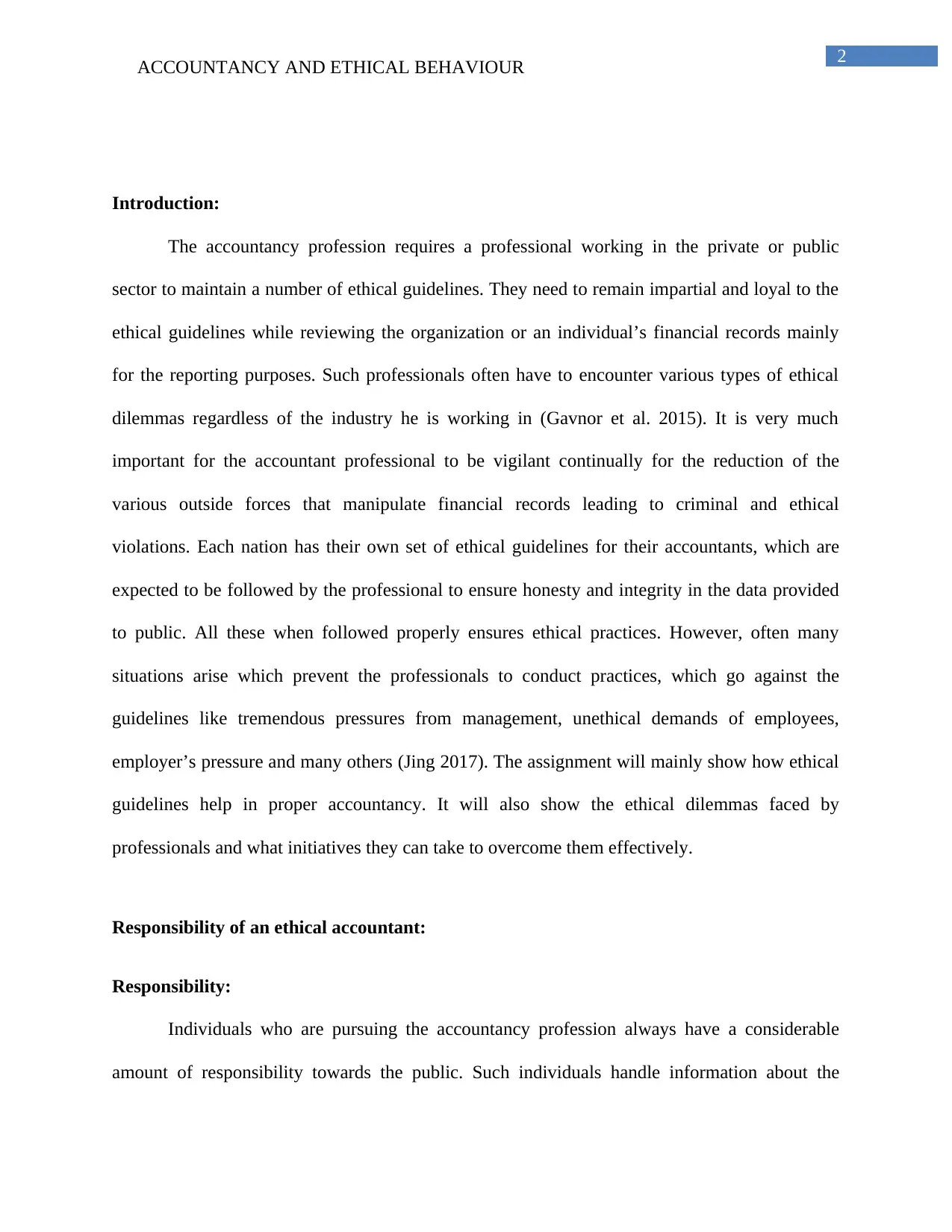
2
ACCOUNTANCY AND ETHICAL BEHAVIOUR
Introduction:
The accountancy profession requires a professional working in the private or public
sector to maintain a number of ethical guidelines. They need to remain impartial and loyal to the
ethical guidelines while reviewing the organization or an individual’s financial records mainly
for the reporting purposes. Such professionals often have to encounter various types of ethical
dilemmas regardless of the industry he is working in (Gavnor et al. 2015). It is very much
important for the accountant professional to be vigilant continually for the reduction of the
various outside forces that manipulate financial records leading to criminal and ethical
violations. Each nation has their own set of ethical guidelines for their accountants, which are
expected to be followed by the professional to ensure honesty and integrity in the data provided
to public. All these when followed properly ensures ethical practices. However, often many
situations arise which prevent the professionals to conduct practices, which go against the
guidelines like tremendous pressures from management, unethical demands of employees,
employer’s pressure and many others (Jing 2017). The assignment will mainly show how ethical
guidelines help in proper accountancy. It will also show the ethical dilemmas faced by
professionals and what initiatives they can take to overcome them effectively.
Responsibility of an ethical accountant:
Responsibility:
Individuals who are pursuing the accountancy profession always have a considerable
amount of responsibility towards the public. Such individuals handle information about the
ACCOUNTANCY AND ETHICAL BEHAVIOUR
Introduction:
The accountancy profession requires a professional working in the private or public
sector to maintain a number of ethical guidelines. They need to remain impartial and loyal to the
ethical guidelines while reviewing the organization or an individual’s financial records mainly
for the reporting purposes. Such professionals often have to encounter various types of ethical
dilemmas regardless of the industry he is working in (Gavnor et al. 2015). It is very much
important for the accountant professional to be vigilant continually for the reduction of the
various outside forces that manipulate financial records leading to criminal and ethical
violations. Each nation has their own set of ethical guidelines for their accountants, which are
expected to be followed by the professional to ensure honesty and integrity in the data provided
to public. All these when followed properly ensures ethical practices. However, often many
situations arise which prevent the professionals to conduct practices, which go against the
guidelines like tremendous pressures from management, unethical demands of employees,
employer’s pressure and many others (Jing 2017). The assignment will mainly show how ethical
guidelines help in proper accountancy. It will also show the ethical dilemmas faced by
professionals and what initiatives they can take to overcome them effectively.
Responsibility of an ethical accountant:
Responsibility:
Individuals who are pursuing the accountancy profession always have a considerable
amount of responsibility towards the public. Such individuals handle information about the
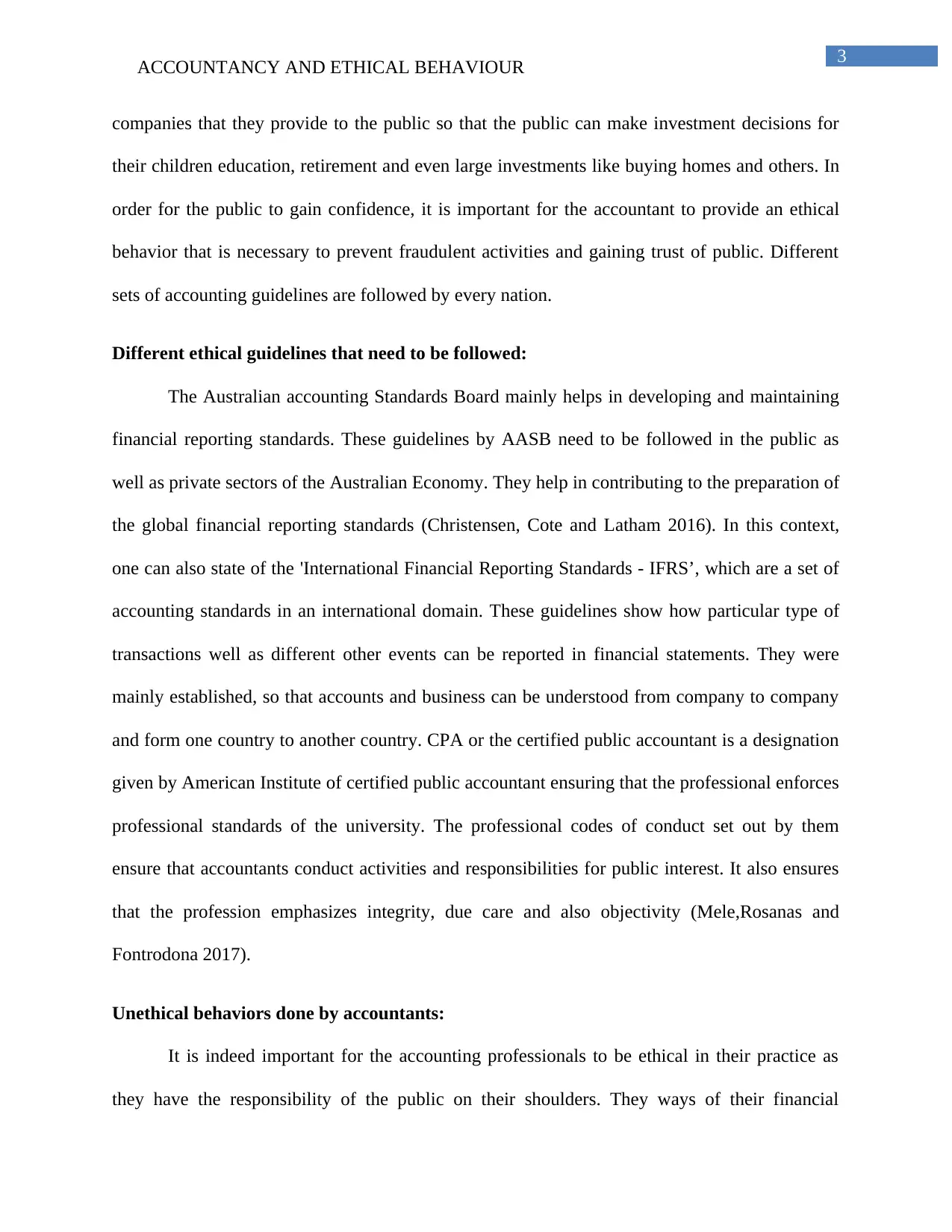
3
ACCOUNTANCY AND ETHICAL BEHAVIOUR
companies that they provide to the public so that the public can make investment decisions for
their children education, retirement and even large investments like buying homes and others. In
order for the public to gain confidence, it is important for the accountant to provide an ethical
behavior that is necessary to prevent fraudulent activities and gaining trust of public. Different
sets of accounting guidelines are followed by every nation.
Different ethical guidelines that need to be followed:
The Australian accounting Standards Board mainly helps in developing and maintaining
financial reporting standards. These guidelines by AASB need to be followed in the public as
well as private sectors of the Australian Economy. They help in contributing to the preparation of
the global financial reporting standards (Christensen, Cote and Latham 2016). In this context,
one can also state of the 'International Financial Reporting Standards - IFRS’, which are a set of
accounting standards in an international domain. These guidelines show how particular type of
transactions well as different other events can be reported in financial statements. They were
mainly established, so that accounts and business can be understood from company to company
and form one country to another country. CPA or the certified public accountant is a designation
given by American Institute of certified public accountant ensuring that the professional enforces
professional standards of the university. The professional codes of conduct set out by them
ensure that accountants conduct activities and responsibilities for public interest. It also ensures
that the profession emphasizes integrity, due care and also objectivity (Mele,Rosanas and
Fontrodona 2017).
Unethical behaviors done by accountants:
It is indeed important for the accounting professionals to be ethical in their practice as
they have the responsibility of the public on their shoulders. They ways of their financial
ACCOUNTANCY AND ETHICAL BEHAVIOUR
companies that they provide to the public so that the public can make investment decisions for
their children education, retirement and even large investments like buying homes and others. In
order for the public to gain confidence, it is important for the accountant to provide an ethical
behavior that is necessary to prevent fraudulent activities and gaining trust of public. Different
sets of accounting guidelines are followed by every nation.
Different ethical guidelines that need to be followed:
The Australian accounting Standards Board mainly helps in developing and maintaining
financial reporting standards. These guidelines by AASB need to be followed in the public as
well as private sectors of the Australian Economy. They help in contributing to the preparation of
the global financial reporting standards (Christensen, Cote and Latham 2016). In this context,
one can also state of the 'International Financial Reporting Standards - IFRS’, which are a set of
accounting standards in an international domain. These guidelines show how particular type of
transactions well as different other events can be reported in financial statements. They were
mainly established, so that accounts and business can be understood from company to company
and form one country to another country. CPA or the certified public accountant is a designation
given by American Institute of certified public accountant ensuring that the professional enforces
professional standards of the university. The professional codes of conduct set out by them
ensure that accountants conduct activities and responsibilities for public interest. It also ensures
that the profession emphasizes integrity, due care and also objectivity (Mele,Rosanas and
Fontrodona 2017).
Unethical behaviors done by accountants:
It is indeed important for the accounting professionals to be ethical in their practice as
they have the responsibility of the public on their shoulders. They ways of their financial
Secure Best Marks with AI Grader
Need help grading? Try our AI Grader for instant feedback on your assignments.
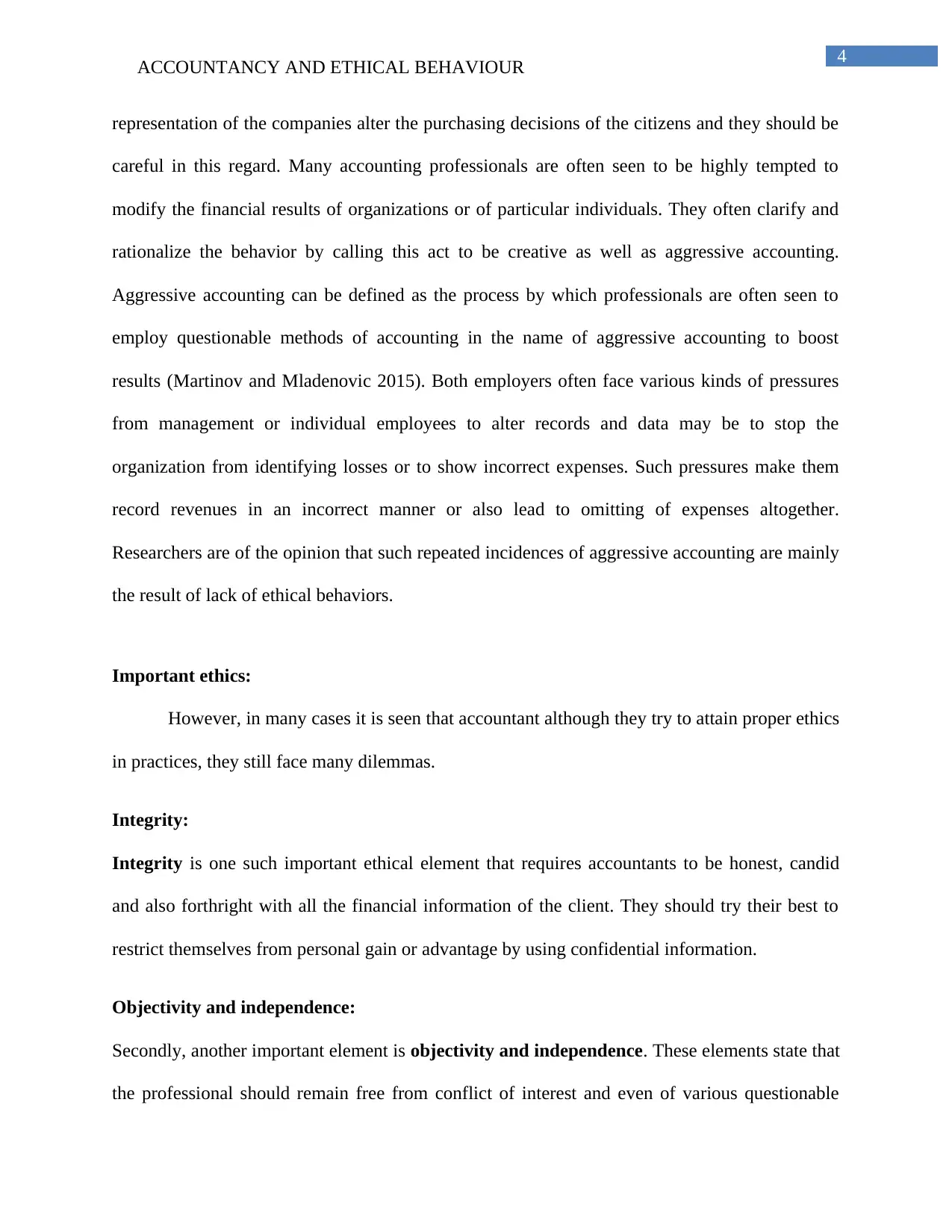
4
ACCOUNTANCY AND ETHICAL BEHAVIOUR
representation of the companies alter the purchasing decisions of the citizens and they should be
careful in this regard. Many accounting professionals are often seen to be highly tempted to
modify the financial results of organizations or of particular individuals. They often clarify and
rationalize the behavior by calling this act to be creative as well as aggressive accounting.
Aggressive accounting can be defined as the process by which professionals are often seen to
employ questionable methods of accounting in the name of aggressive accounting to boost
results (Martinov and Mladenovic 2015). Both employers often face various kinds of pressures
from management or individual employees to alter records and data may be to stop the
organization from identifying losses or to show incorrect expenses. Such pressures make them
record revenues in an incorrect manner or also lead to omitting of expenses altogether.
Researchers are of the opinion that such repeated incidences of aggressive accounting are mainly
the result of lack of ethical behaviors.
Important ethics:
However, in many cases it is seen that accountant although they try to attain proper ethics
in practices, they still face many dilemmas.
Integrity:
Integrity is one such important ethical element that requires accountants to be honest, candid
and also forthright with all the financial information of the client. They should try their best to
restrict themselves from personal gain or advantage by using confidential information.
Objectivity and independence:
Secondly, another important element is objectivity and independence. These elements state that
the professional should remain free from conflict of interest and even of various questionable
ACCOUNTANCY AND ETHICAL BEHAVIOUR
representation of the companies alter the purchasing decisions of the citizens and they should be
careful in this regard. Many accounting professionals are often seen to be highly tempted to
modify the financial results of organizations or of particular individuals. They often clarify and
rationalize the behavior by calling this act to be creative as well as aggressive accounting.
Aggressive accounting can be defined as the process by which professionals are often seen to
employ questionable methods of accounting in the name of aggressive accounting to boost
results (Martinov and Mladenovic 2015). Both employers often face various kinds of pressures
from management or individual employees to alter records and data may be to stop the
organization from identifying losses or to show incorrect expenses. Such pressures make them
record revenues in an incorrect manner or also lead to omitting of expenses altogether.
Researchers are of the opinion that such repeated incidences of aggressive accounting are mainly
the result of lack of ethical behaviors.
Important ethics:
However, in many cases it is seen that accountant although they try to attain proper ethics
in practices, they still face many dilemmas.
Integrity:
Integrity is one such important ethical element that requires accountants to be honest, candid
and also forthright with all the financial information of the client. They should try their best to
restrict themselves from personal gain or advantage by using confidential information.
Objectivity and independence:
Secondly, another important element is objectivity and independence. These elements state that
the professional should remain free from conflict of interest and even of various questionable
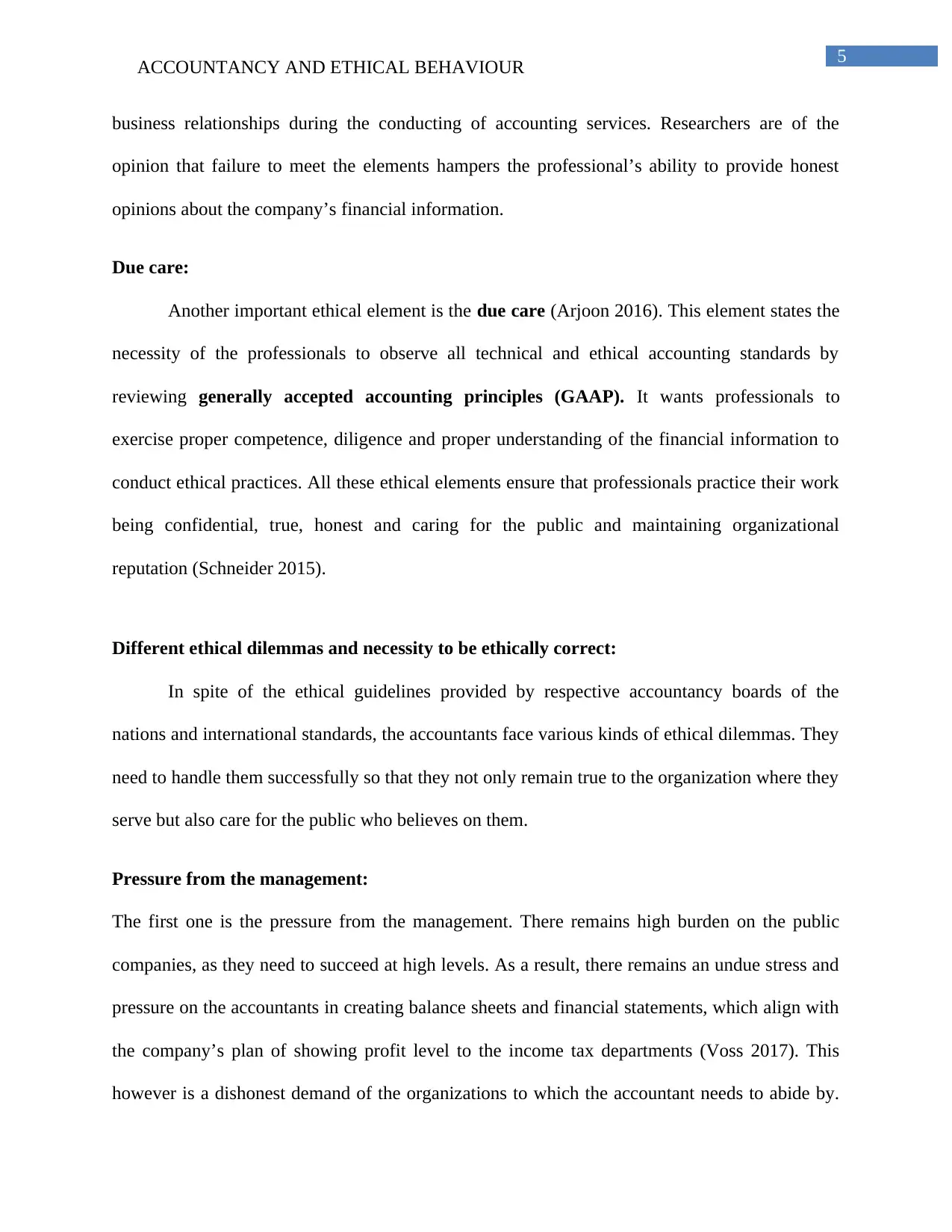
5
ACCOUNTANCY AND ETHICAL BEHAVIOUR
business relationships during the conducting of accounting services. Researchers are of the
opinion that failure to meet the elements hampers the professional’s ability to provide honest
opinions about the company’s financial information.
Due care:
Another important ethical element is the due care (Arjoon 2016). This element states the
necessity of the professionals to observe all technical and ethical accounting standards by
reviewing generally accepted accounting principles (GAAP). It wants professionals to
exercise proper competence, diligence and proper understanding of the financial information to
conduct ethical practices. All these ethical elements ensure that professionals practice their work
being confidential, true, honest and caring for the public and maintaining organizational
reputation (Schneider 2015).
Different ethical dilemmas and necessity to be ethically correct:
In spite of the ethical guidelines provided by respective accountancy boards of the
nations and international standards, the accountants face various kinds of ethical dilemmas. They
need to handle them successfully so that they not only remain true to the organization where they
serve but also care for the public who believes on them.
Pressure from the management:
The first one is the pressure from the management. There remains high burden on the public
companies, as they need to succeed at high levels. As a result, there remains an undue stress and
pressure on the accountants in creating balance sheets and financial statements, which align with
the company’s plan of showing profit level to the income tax departments (Voss 2017). This
however is a dishonest demand of the organizations to which the accountant needs to abide by.
ACCOUNTANCY AND ETHICAL BEHAVIOUR
business relationships during the conducting of accounting services. Researchers are of the
opinion that failure to meet the elements hampers the professional’s ability to provide honest
opinions about the company’s financial information.
Due care:
Another important ethical element is the due care (Arjoon 2016). This element states the
necessity of the professionals to observe all technical and ethical accounting standards by
reviewing generally accepted accounting principles (GAAP). It wants professionals to
exercise proper competence, diligence and proper understanding of the financial information to
conduct ethical practices. All these ethical elements ensure that professionals practice their work
being confidential, true, honest and caring for the public and maintaining organizational
reputation (Schneider 2015).
Different ethical dilemmas and necessity to be ethically correct:
In spite of the ethical guidelines provided by respective accountancy boards of the
nations and international standards, the accountants face various kinds of ethical dilemmas. They
need to handle them successfully so that they not only remain true to the organization where they
serve but also care for the public who believes on them.
Pressure from the management:
The first one is the pressure from the management. There remains high burden on the public
companies, as they need to succeed at high levels. As a result, there remains an undue stress and
pressure on the accountants in creating balance sheets and financial statements, which align with
the company’s plan of showing profit level to the income tax departments (Voss 2017). This
however is a dishonest demand of the organizations to which the accountant needs to abide by.
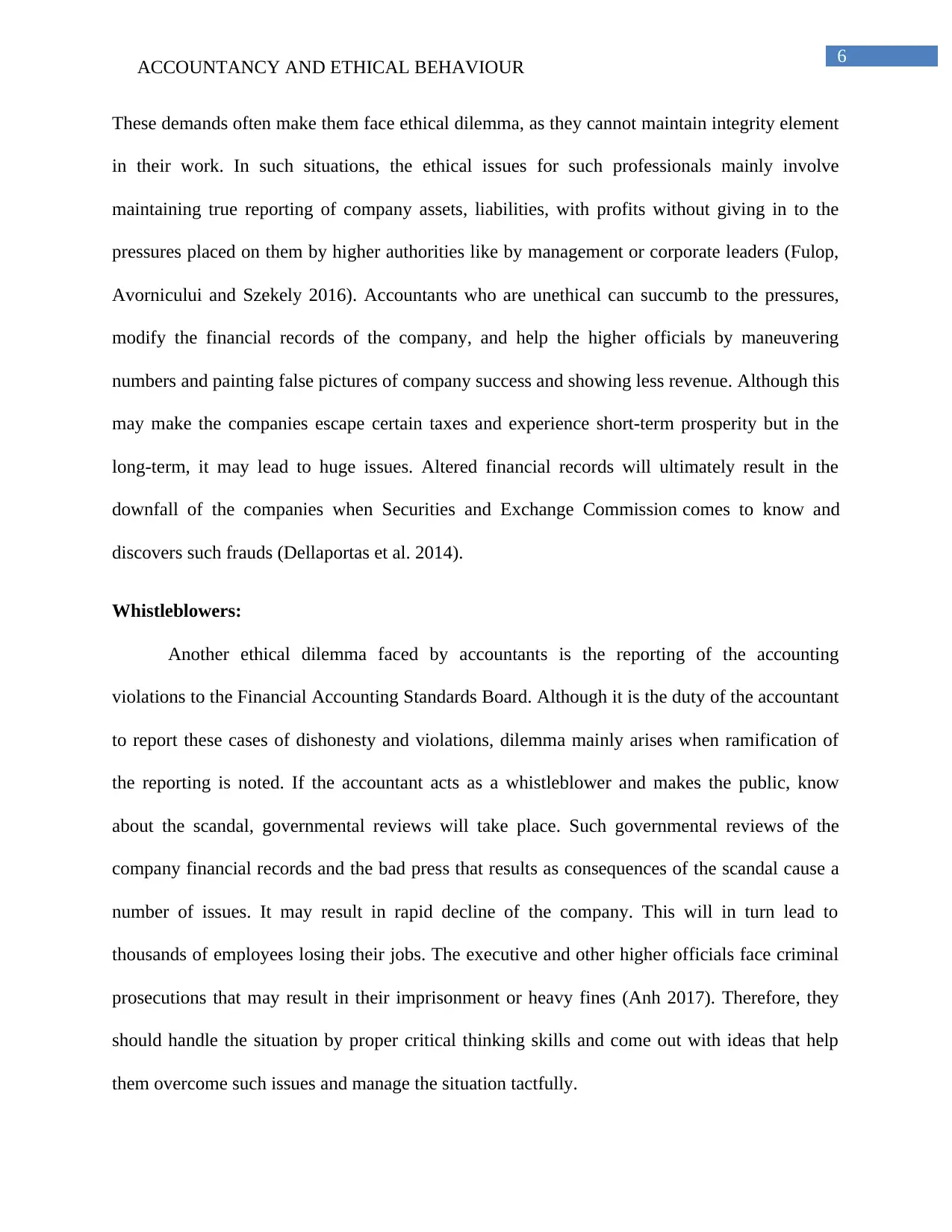
6
ACCOUNTANCY AND ETHICAL BEHAVIOUR
These demands often make them face ethical dilemma, as they cannot maintain integrity element
in their work. In such situations, the ethical issues for such professionals mainly involve
maintaining true reporting of company assets, liabilities, with profits without giving in to the
pressures placed on them by higher authorities like by management or corporate leaders (Fulop,
Avornicului and Szekely 2016). Accountants who are unethical can succumb to the pressures,
modify the financial records of the company, and help the higher officials by maneuvering
numbers and painting false pictures of company success and showing less revenue. Although this
may make the companies escape certain taxes and experience short-term prosperity but in the
long-term, it may lead to huge issues. Altered financial records will ultimately result in the
downfall of the companies when Securities and Exchange Commission comes to know and
discovers such frauds (Dellaportas et al. 2014).
Whistleblowers:
Another ethical dilemma faced by accountants is the reporting of the accounting
violations to the Financial Accounting Standards Board. Although it is the duty of the accountant
to report these cases of dishonesty and violations, dilemma mainly arises when ramification of
the reporting is noted. If the accountant acts as a whistleblower and makes the public, know
about the scandal, governmental reviews will take place. Such governmental reviews of the
company financial records and the bad press that results as consequences of the scandal cause a
number of issues. It may result in rapid decline of the company. This will in turn lead to
thousands of employees losing their jobs. The executive and other higher officials face criminal
prosecutions that may result in their imprisonment or heavy fines (Anh 2017). Therefore, they
should handle the situation by proper critical thinking skills and come out with ideas that help
them overcome such issues and manage the situation tactfully.
ACCOUNTANCY AND ETHICAL BEHAVIOUR
These demands often make them face ethical dilemma, as they cannot maintain integrity element
in their work. In such situations, the ethical issues for such professionals mainly involve
maintaining true reporting of company assets, liabilities, with profits without giving in to the
pressures placed on them by higher authorities like by management or corporate leaders (Fulop,
Avornicului and Szekely 2016). Accountants who are unethical can succumb to the pressures,
modify the financial records of the company, and help the higher officials by maneuvering
numbers and painting false pictures of company success and showing less revenue. Although this
may make the companies escape certain taxes and experience short-term prosperity but in the
long-term, it may lead to huge issues. Altered financial records will ultimately result in the
downfall of the companies when Securities and Exchange Commission comes to know and
discovers such frauds (Dellaportas et al. 2014).
Whistleblowers:
Another ethical dilemma faced by accountants is the reporting of the accounting
violations to the Financial Accounting Standards Board. Although it is the duty of the accountant
to report these cases of dishonesty and violations, dilemma mainly arises when ramification of
the reporting is noted. If the accountant acts as a whistleblower and makes the public, know
about the scandal, governmental reviews will take place. Such governmental reviews of the
company financial records and the bad press that results as consequences of the scandal cause a
number of issues. It may result in rapid decline of the company. This will in turn lead to
thousands of employees losing their jobs. The executive and other higher officials face criminal
prosecutions that may result in their imprisonment or heavy fines (Anh 2017). Therefore, they
should handle the situation by proper critical thinking skills and come out with ideas that help
them overcome such issues and manage the situation tactfully.
Paraphrase This Document
Need a fresh take? Get an instant paraphrase of this document with our AI Paraphraser
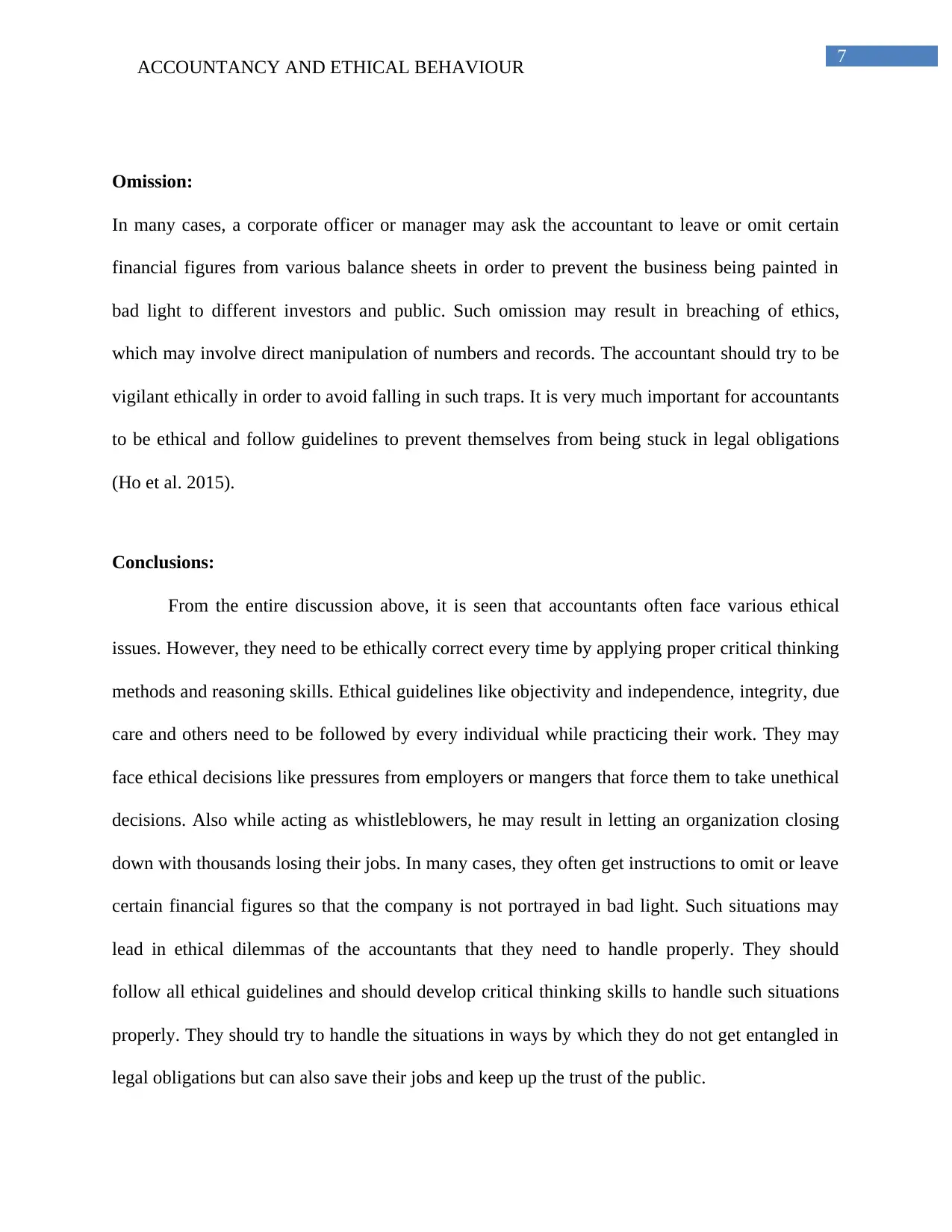
7
ACCOUNTANCY AND ETHICAL BEHAVIOUR
Omission:
In many cases, a corporate officer or manager may ask the accountant to leave or omit certain
financial figures from various balance sheets in order to prevent the business being painted in
bad light to different investors and public. Such omission may result in breaching of ethics,
which may involve direct manipulation of numbers and records. The accountant should try to be
vigilant ethically in order to avoid falling in such traps. It is very much important for accountants
to be ethical and follow guidelines to prevent themselves from being stuck in legal obligations
(Ho et al. 2015).
Conclusions:
From the entire discussion above, it is seen that accountants often face various ethical
issues. However, they need to be ethically correct every time by applying proper critical thinking
methods and reasoning skills. Ethical guidelines like objectivity and independence, integrity, due
care and others need to be followed by every individual while practicing their work. They may
face ethical decisions like pressures from employers or mangers that force them to take unethical
decisions. Also while acting as whistleblowers, he may result in letting an organization closing
down with thousands losing their jobs. In many cases, they often get instructions to omit or leave
certain financial figures so that the company is not portrayed in bad light. Such situations may
lead in ethical dilemmas of the accountants that they need to handle properly. They should
follow all ethical guidelines and should develop critical thinking skills to handle such situations
properly. They should try to handle the situations in ways by which they do not get entangled in
legal obligations but can also save their jobs and keep up the trust of the public.
ACCOUNTANCY AND ETHICAL BEHAVIOUR
Omission:
In many cases, a corporate officer or manager may ask the accountant to leave or omit certain
financial figures from various balance sheets in order to prevent the business being painted in
bad light to different investors and public. Such omission may result in breaching of ethics,
which may involve direct manipulation of numbers and records. The accountant should try to be
vigilant ethically in order to avoid falling in such traps. It is very much important for accountants
to be ethical and follow guidelines to prevent themselves from being stuck in legal obligations
(Ho et al. 2015).
Conclusions:
From the entire discussion above, it is seen that accountants often face various ethical
issues. However, they need to be ethically correct every time by applying proper critical thinking
methods and reasoning skills. Ethical guidelines like objectivity and independence, integrity, due
care and others need to be followed by every individual while practicing their work. They may
face ethical decisions like pressures from employers or mangers that force them to take unethical
decisions. Also while acting as whistleblowers, he may result in letting an organization closing
down with thousands losing their jobs. In many cases, they often get instructions to omit or leave
certain financial figures so that the company is not portrayed in bad light. Such situations may
lead in ethical dilemmas of the accountants that they need to handle properly. They should
follow all ethical guidelines and should develop critical thinking skills to handle such situations
properly. They should try to handle the situations in ways by which they do not get entangled in
legal obligations but can also save their jobs and keep up the trust of the public.
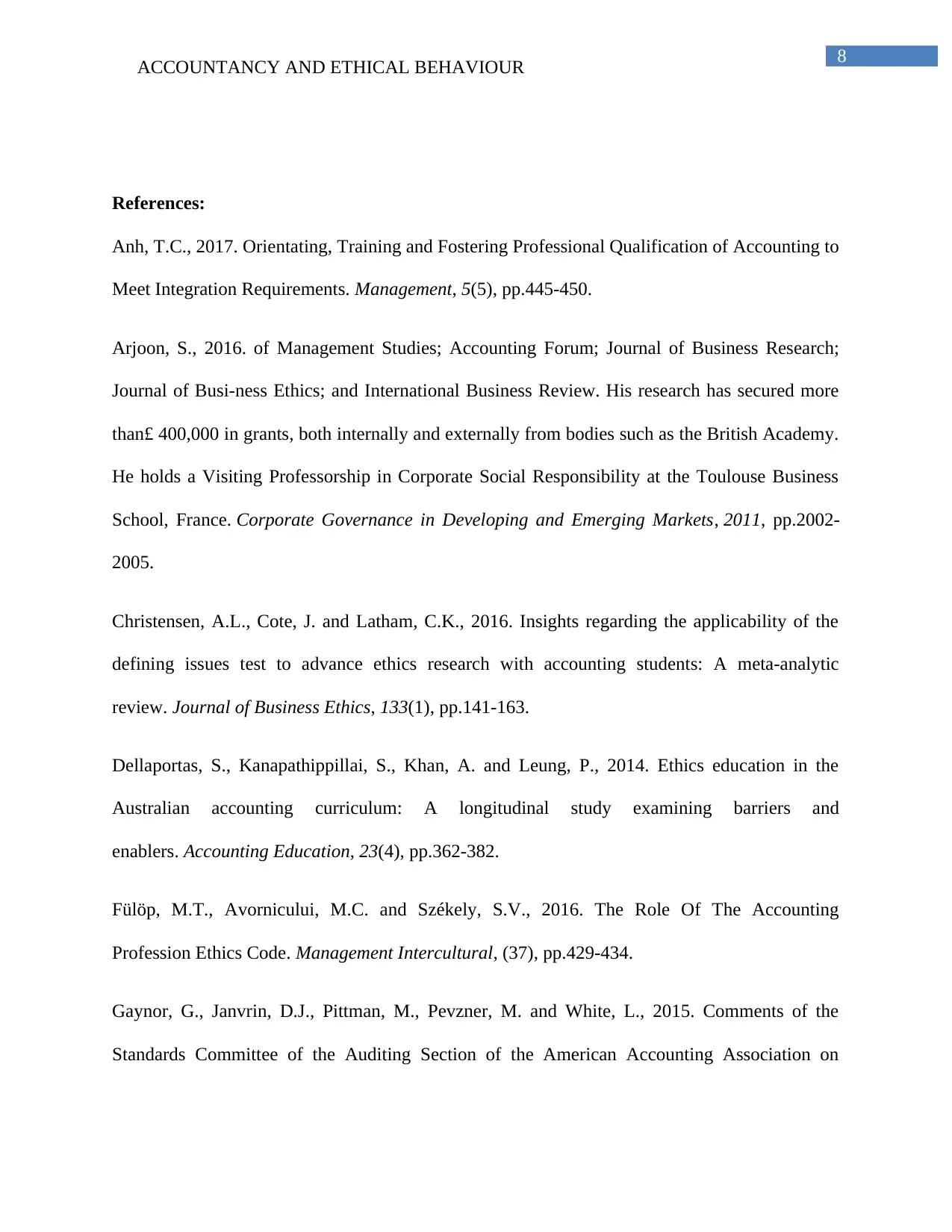
8
ACCOUNTANCY AND ETHICAL BEHAVIOUR
References:
Anh, T.C., 2017. Orientating, Training and Fostering Professional Qualification of Accounting to
Meet Integration Requirements. Management, 5(5), pp.445-450.
Arjoon, S., 2016. of Management Studies; Accounting Forum; Journal of Business Research;
Journal of Busi-ness Ethics; and International Business Review. His research has secured more
than£ 400,000 in grants, both internally and externally from bodies such as the British Academy.
He holds a Visiting Professorship in Corporate Social Responsibility at the Toulouse Business
School, France. Corporate Governance in Developing and Emerging Markets, 2011, pp.2002-
2005.
Christensen, A.L., Cote, J. and Latham, C.K., 2016. Insights regarding the applicability of the
defining issues test to advance ethics research with accounting students: A meta-analytic
review. Journal of Business Ethics, 133(1), pp.141-163.
Dellaportas, S., Kanapathippillai, S., Khan, A. and Leung, P., 2014. Ethics education in the
Australian accounting curriculum: A longitudinal study examining barriers and
enablers. Accounting Education, 23(4), pp.362-382.
Fülöp, M.T., Avornicului, M.C. and Székely, S.V., 2016. The Role Of The Accounting
Profession Ethics Code. Management Intercultural, (37), pp.429-434.
Gaynor, G., Janvrin, D.J., Pittman, M., Pevzner, M. and White, L., 2015. Comments of the
Standards Committee of the Auditing Section of the American Accounting Association on
ACCOUNTANCY AND ETHICAL BEHAVIOUR
References:
Anh, T.C., 2017. Orientating, Training and Fostering Professional Qualification of Accounting to
Meet Integration Requirements. Management, 5(5), pp.445-450.
Arjoon, S., 2016. of Management Studies; Accounting Forum; Journal of Business Research;
Journal of Busi-ness Ethics; and International Business Review. His research has secured more
than£ 400,000 in grants, both internally and externally from bodies such as the British Academy.
He holds a Visiting Professorship in Corporate Social Responsibility at the Toulouse Business
School, France. Corporate Governance in Developing and Emerging Markets, 2011, pp.2002-
2005.
Christensen, A.L., Cote, J. and Latham, C.K., 2016. Insights regarding the applicability of the
defining issues test to advance ethics research with accounting students: A meta-analytic
review. Journal of Business Ethics, 133(1), pp.141-163.
Dellaportas, S., Kanapathippillai, S., Khan, A. and Leung, P., 2014. Ethics education in the
Australian accounting curriculum: A longitudinal study examining barriers and
enablers. Accounting Education, 23(4), pp.362-382.
Fülöp, M.T., Avornicului, M.C. and Székely, S.V., 2016. The Role Of The Accounting
Profession Ethics Code. Management Intercultural, (37), pp.429-434.
Gaynor, G., Janvrin, D.J., Pittman, M., Pevzner, M. and White, L., 2015. Comments of the
Standards Committee of the Auditing Section of the American Accounting Association on
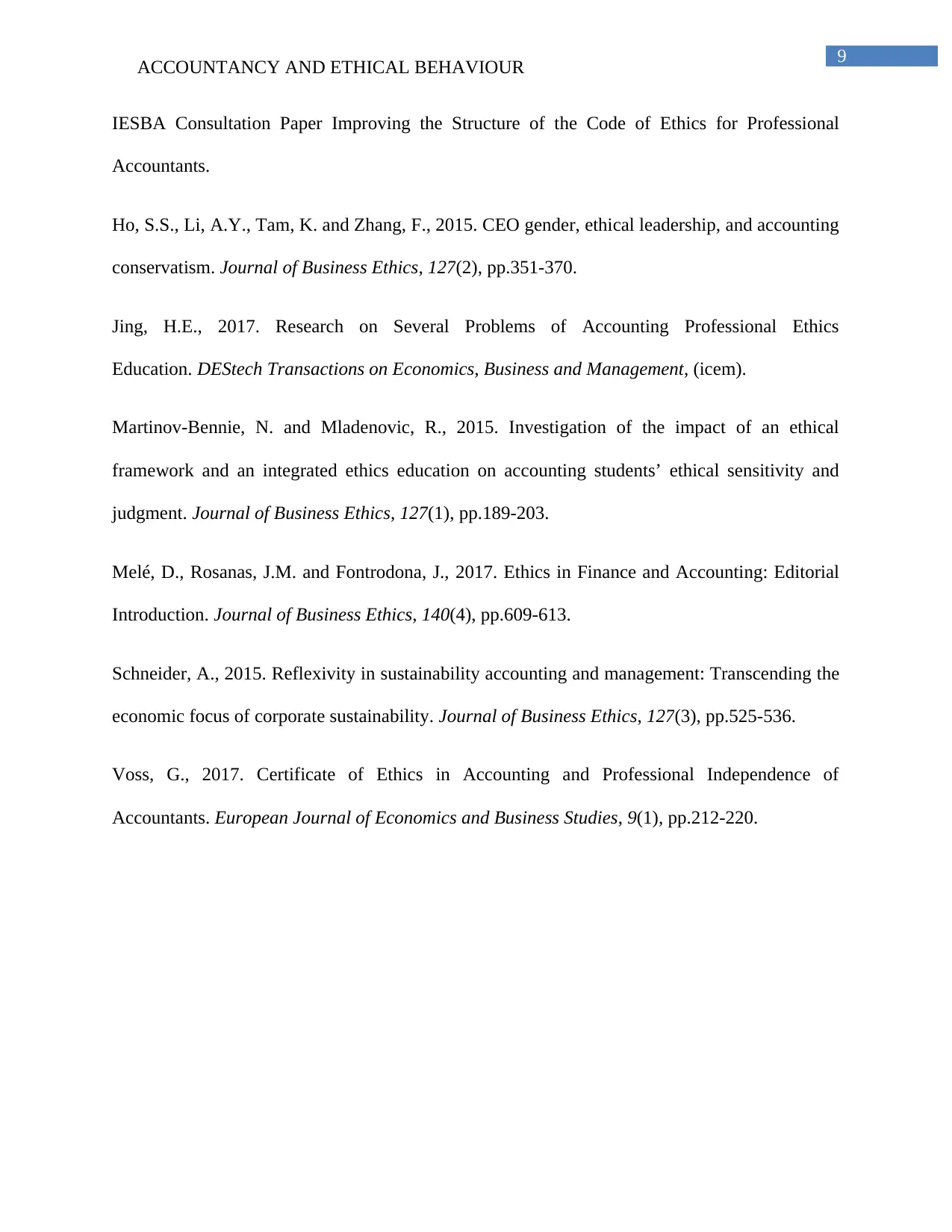
9
ACCOUNTANCY AND ETHICAL BEHAVIOUR
IESBA Consultation Paper Improving the Structure of the Code of Ethics for Professional
Accountants.
Ho, S.S., Li, A.Y., Tam, K. and Zhang, F., 2015. CEO gender, ethical leadership, and accounting
conservatism. Journal of Business Ethics, 127(2), pp.351-370.
Jing, H.E., 2017. Research on Several Problems of Accounting Professional Ethics
Education. DEStech Transactions on Economics, Business and Management, (icem).
Martinov-Bennie, N. and Mladenovic, R., 2015. Investigation of the impact of an ethical
framework and an integrated ethics education on accounting students’ ethical sensitivity and
judgment. Journal of Business Ethics, 127(1), pp.189-203.
Melé, D., Rosanas, J.M. and Fontrodona, J., 2017. Ethics in Finance and Accounting: Editorial
Introduction. Journal of Business Ethics, 140(4), pp.609-613.
Schneider, A., 2015. Reflexivity in sustainability accounting and management: Transcending the
economic focus of corporate sustainability. Journal of Business Ethics, 127(3), pp.525-536.
Voss, G., 2017. Certificate of Ethics in Accounting and Professional Independence of
Accountants. European Journal of Economics and Business Studies, 9(1), pp.212-220.
ACCOUNTANCY AND ETHICAL BEHAVIOUR
IESBA Consultation Paper Improving the Structure of the Code of Ethics for Professional
Accountants.
Ho, S.S., Li, A.Y., Tam, K. and Zhang, F., 2015. CEO gender, ethical leadership, and accounting
conservatism. Journal of Business Ethics, 127(2), pp.351-370.
Jing, H.E., 2017. Research on Several Problems of Accounting Professional Ethics
Education. DEStech Transactions on Economics, Business and Management, (icem).
Martinov-Bennie, N. and Mladenovic, R., 2015. Investigation of the impact of an ethical
framework and an integrated ethics education on accounting students’ ethical sensitivity and
judgment. Journal of Business Ethics, 127(1), pp.189-203.
Melé, D., Rosanas, J.M. and Fontrodona, J., 2017. Ethics in Finance and Accounting: Editorial
Introduction. Journal of Business Ethics, 140(4), pp.609-613.
Schneider, A., 2015. Reflexivity in sustainability accounting and management: Transcending the
economic focus of corporate sustainability. Journal of Business Ethics, 127(3), pp.525-536.
Voss, G., 2017. Certificate of Ethics in Accounting and Professional Independence of
Accountants. European Journal of Economics and Business Studies, 9(1), pp.212-220.
1 out of 10
Related Documents
Your All-in-One AI-Powered Toolkit for Academic Success.
+13062052269
info@desklib.com
Available 24*7 on WhatsApp / Email
![[object Object]](/_next/static/media/star-bottom.7253800d.svg)
Unlock your academic potential
© 2024 | Zucol Services PVT LTD | All rights reserved.




